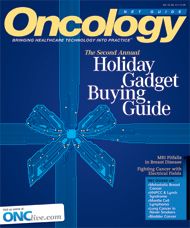Publication
Article
ONCNG Oncology
Information Overload in Oncology: A Critical Role for Innovative Information Technology
Author(s):
It is well-recognized that medicine is becoming far more complex with each passing year, especially cancer medicine. It was not that many years ago when an oncologist caring for a patient with advanced lung cancer would only need to know if the malignancy was small cell versus any other histology (squamous, adenocarcinoma, large cell, bronchoalveolar) to develop a rational management plan.
It is well-recognized that medicine is becoming far more complex with each passing year, especially cancer medicine. It was not that many years ago when an oncologist caring for a patient with advanced lung cancer would only need to know if the malignancy was small cell versus any other histology (squamous, adenocarcinoma, large cell, bronchoalveolar) to develop a rational management plan.
While patients with localized small cell lung cancer were treated with a unique strategy of cytotoxic chemotherapy, all other morphologies were treated almost identically based on the extent of tumor spread at diagnosis. The debate regarding systemic therapy, if one actually existed, focused on whether patients should be treated with single-agent versus combination chemotherapy, or whether carboplatin was equivalent to cisplatin in therapeutic efficacy. Toxicities associated with systemic treatment of lung cancer were also fairly standard and predictable, principally including emesis and bone marrow suppression.
Recently, however, a variety of additional side effects have been added to the potential list of concerns, including neuropathy and rash. But is a rash a good sign or a bad event in a patient receiving anti-neoplastic therapy with an inhibitor of the epidermal growth-factor receptor (EGFR)? Does an event signify biological activity for the drug, and should the dose be increased or the drug abandoned if a rash does not develop? Further, should all patients with non-small cell lung cancer (NSCLC) be tested for the presence of an EGFR mutation, and at what point in the natural history of the illness? What about other recently identified molecular abnormalities present in a subset of patients with NSCLC? There are so many questions, and these relate only to a single type of cancer.
Consider, for a moment, the major changes that took place over the past 5 to 8 years in the management of breast, colon, and kidney malignancies, as well as treatment of myeloma, non-Hodgkin lymphoma, and chronic myelogenous leukemia. How can a busy practicing oncologist keep up with the rapidly accelerating changes in disease management and remember critically important and detailed information regarding issues of both efficacy and toxicity while also considering questions of comorbidity, pharmacogenomics, and unique molecular features of the individual tumor types? Today, identifying KRAS mutations in metastatic colon cancer is key to determining treatment,1 but tomorrow it may be a new molecular marker that defines efficacy, toxicity, or drug interactions in any number of malignancies.
The capacity of the human brain, as spectacular as it is, to remember and process new information has finite limits. At some point oncologists will simply be unable to optimally determine which anti-neoplastic agents should be given in a particular setting, or where they should be avoided due to potential negative consequences or risk of interactions. At what point will well-trained and well- intentioned clinicians be unable to efficiently process data indicating an unusual physical finding or associate a fleeting patient complaint with a previously reported, rare, and dangerous event following delivery of a novel targeted anti-neoplastic agent?
One solution to the serious and complex problem of information overload in oncology is to use advances in information technology to assist oncologists in their efforts to effectively and safely treat patients, such as by highlighting uncommon side effects. One can easily envision an oncologist entering the names of the drugs a patient is receiving for their cancer and other medical conditions or a particular symptom or symptom complex into a handheld device, which will then immediately display previously reported data (individual reports, a published review article, or even material displayed in summary form) of known or suspected drug effects similar to that being observed in the oncologist’s patient. This information could help inform future plans to continue, discontinue, or modify the current therapeutic strategy. Further, the absence of previously published reports revealing any association between a particular therapeutic regimen and an observed unusual sign or symptom can be quite reassuring to the physician and the patient.
It is likely only a matter of time until a comprehensive resource will be developed for oncology, as it is clear that there is an important and potentially quite exciting future for the use of informatics (complex analysis of data from multiple relevant sources: patient age, sex, prior treatment, symptoms, comorbidity, tumor stage, genetic background, histologic and molecular features of the cancer, etc.) to assist the busy practicing clinician in designing an optimal management strategy and in changing that plan based on newly acquired data.2 While services such as Epocrates and Skyscape are already beginning to assist clinicians with such efforts, they do not yet provide the level of support oncologists require. Regardless, they are extremely popular, and as more users turn to such resources, more investments will be made in refining and further expanding these technologies, which have already laid important groundwork.
Maurie Markman, MD, is Editor-in-Chief of Oncology Net Guide and Vice President of Clinical Research for University of Texas MD Anderson Cancer Center in Houston, Texas.
References
1. Jiang Y, Kimchi ET, Staveley-O’Carroll KF, et al. Assessment of K-ras mutation. Cancer. 2009;115(16):3609-3617. Abstract available at: http://tinyurl.com/yl9ydj4.
2. Renear AH, Palmer CL. Strategic reading, ontologies, and the future of scientific publishing. Science. 2009;325(5942):828-832. Abstract available at: http://tinyurl.com/y86cwoh.
